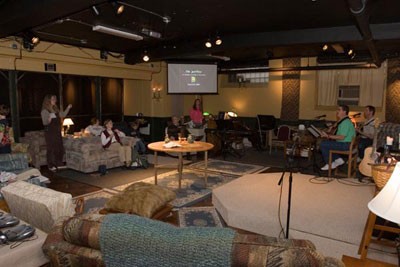Page 2 of 5
Not at Watershed. Here, there's no stuffy organ music, no pretending to leave the secular world at the door in order to find God. "We want to do it in a creative, artistic, humorous, culturally savvy way," says Hofert. "We want to embrace culture."
Not that the church is total avant-garde. "We're not trying to be just some, like, way-out-there, edgy kind of church," he adds. "We embrace our culture, but we attempt to use that to communicate: Here's what God's doing in our culture."
On a recent Sunday, that meant showing clips of Bono speaking at the National Prayer Breakfast. Putting his messianic complex aside, the U2 singer's homily actually was refreshing (anyone exhorting President Bush to pay more attention to the poor is refreshing these days):
"You see, I avoided religious people most of my life. ... One of the things that I picked up from my father and my mother was the sense that religion often gets in the way of God. ... For me, at least, it got in the way. Seeing what religious people, in the name of God, did to my native land ... and in this country, seeing God's second-hand car salesmen on the cable TV channels, offering indulgences for cash ... in fact, all over the world, seeing the self-righteousness roll down like a mighty stream from certain corners of the religious establishment. ... I must confess, I changed the channel. I wanted my MTV."
Bono's words hit home to the congregation at Actor's Theatre.
"Even though I was a believer," the singer continued on the video screen. "Perhaps because I was a believer. I'd always read the Scriptures, even the obscure stuff. There it was in Leviticus (25:35) ... 'If your brother becomes poor,' the Scriptures say, 'and cannot maintain himself ... you shall maintain him ... You shall not lend him your money at interest, not give him your food for profit.'"
After Bono's image had faded from the screen, Hofert took to the stage to preach the values of generosity. But as much as he talked about generosity to the community, he also urged people to make pledges to the church.
Ethnomixocology
Starting churches is a costly business. Watershed, as well as two other emerging churches Creative Loafing visited -- Christ Central Church in NoDa and the Portico in Elizabeth -- rely on the support of more established churches. It's kind of funny to think of churches in downtown and hip art districts like NoDa and Elizabeth as being mission churches, but that's what these three are.

- Angus Lamond
- The congregation at the Portico in Elizabeth gathers on mismatched furniture.
Christ Central Church began two years ago as a "church plant" of Uptown Christ Central Covenant Church, "to reach urban Charlotte and to reach a diversity of people," says pastor Howard Brown. He and assistant pastor Giorgio Hiatt originally wanted to find a place off Central Avenue, but they instead found the Neighborhood Theatre, normally a venue for groups ranging from Jurassic 5 to Kings of Leon to Leon Russell.
"This area just looked diverse," says Brown, sitting at the Smelly Cat coffeehouse across from the theater on 36th Street. An attractive 34-year-old with short dreds and an enthusiastic demeanor, Brown said NoDa was ideal. "It looked like NoDa appreciated art and beauty, and so when we got to the Neighborhood Theatre, we were like, 'This could work.'"
They also knew they didn't want to own a building. "We like the idea of renting," Brown says. "We like the idea of being a part of the community instead of doing something that in many ways could be civically irresponsible -- you put millions of dollars into a building or into property, when that money could be used in so many ways ... in our communities.
"Our goal," he continues, "is to be part of the community, not to be this separate fortress, but to be in step with what's going on around us."
Brown says Christ Central Church has grown steadily to about 150 people. The congregation includes "a mix of different people, from bankers to artists to teachers to social activists to stay-at-home moms to soccer coaches." Quite a change from the established, aging congregation Brown left in Baltimore.
"It's a privilege at Christ Central Church -- there are people who are not believers, who are not Christians -- to be in the congregation, and it's our goal as a church to have a conversation with those who are not Christians, to talk, to learn," Brown says.
But why do nonbelievers come? "I think that one of the initial things that probably draws them is the sense of community at Christ Central Church, and feeling like, OK, these are just people in my neighborhood and in my community," says Brown. "These are normal people I want to be around. Another thing is there's an honest conversation, discussion, about the world, about humanity and about people. I think we all have a common ground at Christ Central Church, whether you're Christian or not."